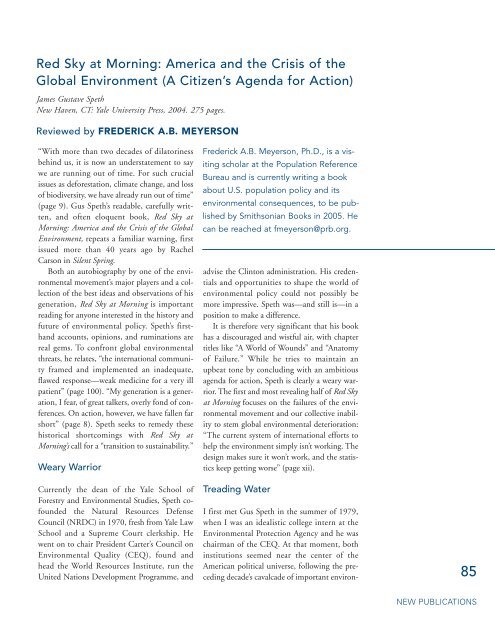Environmental Change and Security Project Report - Woodrow ...
Environmental Change and Security Project Report - Woodrow ...
Environmental Change and Security Project Report - Woodrow ...
You also want an ePaper? Increase the reach of your titles
YUMPU automatically turns print PDFs into web optimized ePapers that Google loves.
Red Sky at Morning: America <strong>and</strong> the Crisis of the<br />
Global Environment (A Citizen’s Agenda for Action)<br />
James Gustave Speth<br />
New Haven, CT: Yale University Press, 2004. 275 pages.<br />
Reviewed by FREDERICK A.B. MEYERSON<br />
“With more than two decades of dilatoriness<br />
behind us, it is now an understatement to say<br />
we are running out of time. For such crucial<br />
issues as deforestation, climate change, <strong>and</strong> loss<br />
of biodiversity, we have already run out of time”<br />
(page 9). Gus Speth’s readable, carefully written,<br />
<strong>and</strong> often eloquent book, Red Sky at<br />
Morning: America <strong>and</strong> the Crisis of the Global<br />
Environment, repeats a familiar warning, first<br />
issued more than 40 years ago by Rachel<br />
Carson in Silent Spring.<br />
Both an autobiography by one of the environmental<br />
movement’s major players <strong>and</strong> a collection<br />
of the best ideas <strong>and</strong> observations of his<br />
generation, Red Sky at Morning is important<br />
reading for anyone interested in the history <strong>and</strong><br />
future of environmental policy. Speth’s firsth<strong>and</strong><br />
accounts, opinions, <strong>and</strong> ruminations are<br />
real gems. To confront global environmental<br />
threats, he relates, “the international community<br />
framed <strong>and</strong> implemented an inadequate,<br />
flawed response—weak medicine for a very ill<br />
patient” (page 100). “My generation is a generation,<br />
I fear, of great talkers, overly fond of conferences.<br />
On action, however, we have fallen far<br />
short” (page 8). Speth seeks to remedy these<br />
historical shortcomings with Red Sky at<br />
Morning’s call for a “transition to sustainability.”<br />
Weary Warrior<br />
Currently the dean of the Yale School of<br />
Forestry <strong>and</strong> <strong>Environmental</strong> Studies, Speth cofounded<br />
the Natural Resources Defense<br />
Council (NRDC) in 1970, fresh from Yale Law<br />
School <strong>and</strong> a Supreme Court clerkship. He<br />
went on to chair President Carter’s Council on<br />
<strong>Environmental</strong> Quality (CEQ), found <strong>and</strong><br />
head the World Resources Institute, run the<br />
United Nations Development Programme, <strong>and</strong><br />
Frederick A.B. Meyerson, Ph.D., is a visiting<br />
scholar at the Population Reference<br />
Bureau <strong>and</strong> is currently writing a book<br />
about U.S. population policy <strong>and</strong> its<br />
environmental consequences, to be published<br />
by Smithsonian Books in 2005. He<br />
can be reached at fmeyerson@prb.org.<br />
advise the Clinton administration. His credentials<br />
<strong>and</strong> opportunities to shape the world of<br />
environmental policy could not possibly be<br />
more impressive. Speth was—<strong>and</strong> still is—in a<br />
position to make a difference.<br />
It is therefore very significant that his book<br />
has a discouraged <strong>and</strong> wistful air, with chapter<br />
titles like “A World of Wounds” <strong>and</strong> “Anatomy<br />
of Failure.” While he tries to maintain an<br />
upbeat tone by concluding with an ambitious<br />
agenda for action, Speth is clearly a weary warrior.<br />
The first <strong>and</strong> most revealing half of Red Sky<br />
at Morning focuses on the failures of the environmental<br />
movement <strong>and</strong> our collective inability<br />
to stem global environmental deterioration:<br />
“The current system of international efforts to<br />
help the environment simply isn’t working. The<br />
design makes sure it won’t work, <strong>and</strong> the statistics<br />
keep getting worse” (page xii).<br />
Treading Water<br />
I first met Gus Speth in the summer of 1979,<br />
when I was an idealistic college intern at the<br />
<strong>Environmental</strong> Protection Agency <strong>and</strong> he was<br />
chairman of the CEQ. At that moment, both<br />
institutions seemed near the center of the<br />
American political universe, following the preceding<br />
decade’s cavalcade of important environ-<br />
85<br />
NEW PUBLICATIONS

















